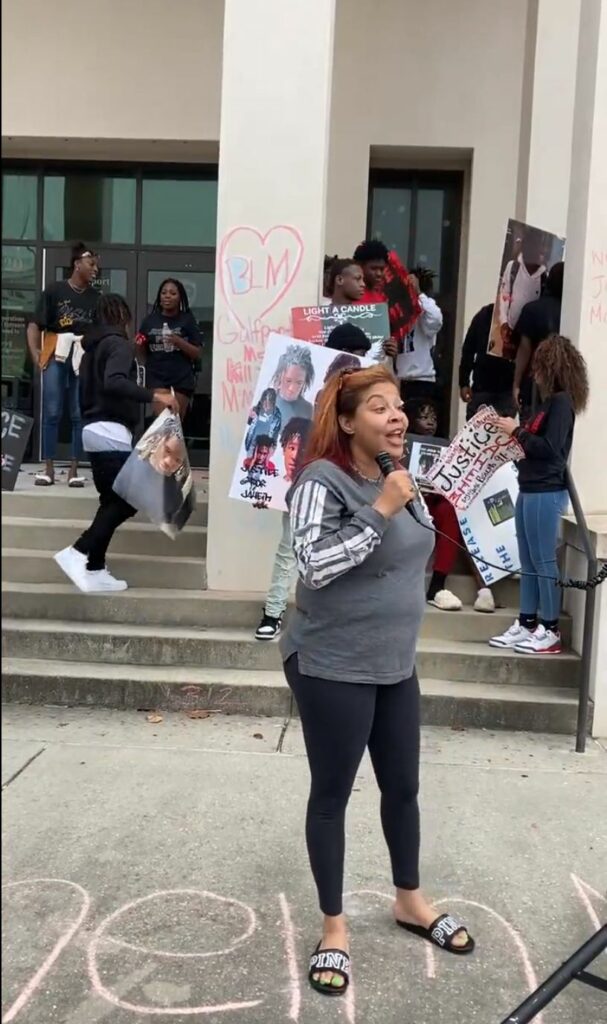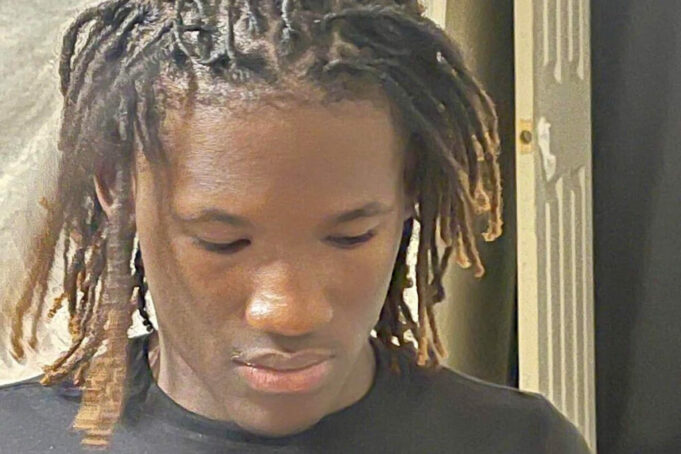Grassroots organizers, community activists, friends and family of Jaheim McMillan, a Black teen, shot and mortally wounded by a Gulfport, Mississippi, police officer at the front of a local Family Dollar, continue their demands that both the store and authorities account for missing video footage from the deadly encounter, nearly two months after the high school freshman’s funeral.
Believing there is a cover-up, protesters are continuing their demands of “Justice for Jaheim” as witnesses dispute the police version of why he was gunned down at the entrance of a grocery store with shoppers inside. They are also calling for a boycott of Family Dollar, and its parent company Dollar Tree, for alleged complicity regarding missing video from the time of the shooting.
“People, in general, are just upset because he was shot in cold blood,” explained Robert Williams, 52, who said that he and a White man both witnessed the entire incident before and after the 15 year old was shot in the head on October 6. “The way the (officer) shot, a few bullets went in the store. He did not have a gun, no sir, he did not, and I was right there,” he said of the teenager who died two days later in an Alabama trauma hospital.
Gulfport police have previously said the teen was armed and did not obey orders to drop a gun, prompting the officer to shoot.

Insisting Jaheim was unarmed as he raised his hands in surrender, Mr. Williams told The Final Call that a White man, wearing a “Blue Lives Matter” T-shirt, angrily confronted the police officer after Jaheim fell to the ground. “He parked in there and he jumped out of his truck and (ran) up on them and asked why did they shoot that boy? He had no gun, and he had no right to shoot him! He was going off,” Mr. Williams said of the witness standing nearby. “I was standing right there, so how a gun got there, I didn’t see a gun, and I was about 10 feet away.”
Marquell Bridges, with Building Bridges for Community Unity and Progress, told The Final Call that the open-carry gun culture in his state adds to a volatile brew of White supremacist paranoia, often exploited by White racists and political opportunists. It is an attitude all too common throughout Mississippi today, he noted. Mr. Bridges also said that the potential for racially motivated bloodshed is real and often projected against Black youth, Black activists and Black causes that advocate for justice and fair dealing.
“I organized a unity walk in Laurel, Mississippi, where I’m from, when I was a board member for BLM Mississippi, and when I did that, we were actually going to the city hall, but somebody just told a lie and said we were coming to mess with a Confederate statue, and it was at the height of the George Floyd situation,” said Mr. Bridges, giving an example of the mindsets harbored by many people and institutions in the state.
“There was a hundred White racist men with assault rifles that showed up and were willing to kill about a statue that we weren’t even coming to. They’re waiting to kill us, they’re waiting for certain things to start happening, so they have an excuse to kill us,” he asserted.
Regarding the City of Gulfport and the shooting of Jaheim, Mr. Bridges said Black people have endured the indignity of institutional racism for so long that many have grown numb to the suffering of others within their own communities. As a result, he said, they choose to remain silent. “We’ve been done so wrong and beaten and persecuted; a lot of people are living in fear. I’ve gotten reports that a lot of Jaheim’s friends want to come out (to protest), but they’re scared,” he said.
“So, every time I’m out there, it’s a majority of Black women, so the Black men are not standing up, the Black men are not going to approach the youth, so all around participation from these different communities that I go to, I typically have to bring in outside help first to show the people it can be done before they begin to support,” Mr. Bridges continued.
Jaheim McMillan’s mother, Katrina Mateen, said she is suffering difficult days and expressed frustration over the slowness of justice and whether it will be properly served. “I’m coping as best as I can. I have my moments every day and for the community, no, I don’t think the community is doing like they should,” Ms. Mateen said in a telephone interview with The Final Call. “The support I have been getting is people outside of the state. Police here terrorize people,” she said.
Reminiscent of the heavy-handed tactics of police in conjunction with the criminal acts of the Ku Klux Klan during Mississippi’s pre-civil rights era, both Ms. Mateen and Mr. Bridges agreed that more people must intervene to shine a light on Jaheim’s death and to educate the masses regarding the human rights of Black people.
According to an e-mail by Dr. Melina Abdullah, Ph.D., co-founder and director of the Los Angeles-based Black Lives Matter Grassroots, their virtual press conference announced on November 29 that “BLM Grassroots is engaged in the fight for justice for 15-year-old #JaheimMcMillan, who was murdered by police in Gulfport, Mississippi, last month. His family has called for a boycott of Family Dollar and Dollar Tree for the company’s role in the theft of Jaheim’s young life,” her statement read in part.
“Corporations are sometimes complicit in the murders of our people, and this is what we’re seeing in Jaheim’s case, we’re seeing the complicity of Family Dollar,” Dr. Abdullah told The Final Call. “So, what we’re seeking to do with the boycott is absolutely demand unedited video from both Family Dollar as well as the dash cam and body cam. So, we’ll apply pressure on elected officials and appointed officials around that, but we’re also trying to shift corporate protocols,” she said, calling attention to a national boycott during the Christmas spending season.
Dr. Abdullah added that the list of demands BLM Grassroots sent to Family Dollar included the following:
Establish a physical memorial for Jaheim McMillan at the Gulfport, Mississippi, store where he was shot and establish a scholarship/community fund in Jaheim’s honor.
Remove armed security and/or police from Family Dollar stores.
Set a “do not call police” policy unless there is an immediate life-threatening situation.
Require mandatory, substantial cultural awareness and sensitivity training for all employees.
Commit to providing the immediate public release of all surveillance video in unedited form whenever there is an instance of police violence.
“That’s what the boycott is about; it’s about protesting for Jaheim and it’s about doing more than protest. It’s about shifting those policies (so) that they honor his legacy,” she said.
Others were thankful for an event that brought them all together.
“My son, Robert Gonzales was murdered on August 31, 2013. I am really grateful for this event. It’s been really hard, especially around the holidays, and not everyone remembers our deceased loved ones. My son was only 21 years old,” Delores Gonzales said.
Rickia Fountain, only nine years old, lost her brother Demetrius Hardy who was just 15 at the time of his death on April 8, 2020. “He was an important person in my life, he would always help me with my homework,” she said. “I miss him a lot.”
Learn more about Never Forget Chicago at: maxwell.emcays.com/neverforgetchi
Shawntell Muhammad can be contacted at [email protected].













